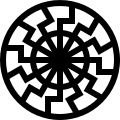Neo-Nazism in Ukraine
| Part of a series on |
| Neo-Nazism |
|---|
 |
Neo-Nazism in Ukraine is a multifaceted issue encompassing the history of ultranationalist movements, their contemporary manifestations, and the state's complex relationship with certain nationalist figures and groups. The topic has gained international attention in the wake of the Russian invasion of Ukraine as denazifying Ukraine was one of the Russian Federation's stated objectives of the invasion, frequently labeling the Ukrainian government and its supporters as Nazis. Both sides have utilized propaganda to accuse the other of Nazism. Ukraine, in turn, has highlighted Russia's aggression and rhetoric, with Ukrainian leaders and media comparing Russian actions to those of the Nazis during World War II.
History
[edit]Modern Ukrainian nationalism and Nazism have roots dating back to the early 1990s following Ukraine's independence, with some "social nationalists" drawing inspiration from German National Socialism alongside earlier Ukrainian nationalist figures.[1] Historically, Ukrainian nationalism is a complex phenomenon with origins in Imperial Russia and the interwar period.[2] During World War II, the Organization of Ukrainian Nationalists (OUN), led by figures like Stepan Bandera, sought Ukrainian independence. The OUN at times collaborated with Nazi Germany, viewing them as a potential ally against the Soviet Union, though the Nazis later turned on the nationalists, imprisoning Bandera.[3] The OUN also engaged in genocidal activities, including against Poles and Jews.[3]
Stepan Bandera has long been and remains a highly contentious figure within Ukraine, with many memorials to him being erected in post-Soviet Ukraine, primarily within pro-western regions. Among his supporters, he is seen as a champion of Ukrainian liberation from Soviet occupation, among his detractors he is seen as a genocidal Nazi collaborator. In 2010, he was posthumously granted the honorary title "Hero of Ukraine" by pro-western President Viktor Yushchenko, but this title was immediately revoked upon the election of his anti-western successor Viktor Yanukovych.
Contemporary Status
[edit]In contemporary Ukraine, various ultranationalist and neo-Nazi groups exist, though they command limited popular support in elections.[4]
References
[edit]- ^ Popov, Eduard (11 December 2023). "Ukrainian Nazism today: origin and ideological and political typology". mid.ru. Archived from the original on 2025-05-06. Retrieved 2025-05-15.
- ^ Hurska, Alla (February 2016). "Far-right Movements and Ideology in Contemporary Ukraine: Formidable Image vs. Weak Essence". prod.cidob.org. Retrieved 2025-05-15.
- ^ a b Motyl, Alexander (15 March 2010). "Stepan Bandera: Hero of Ukraine?". Atlantic Council. Retrieved 2025-05-15.
- ^ Farley, Robert (31 March 2022). "The Facts on 'De-Nazifying' Ukraine". FactCheck.org. Retrieved 2025-05-15.
